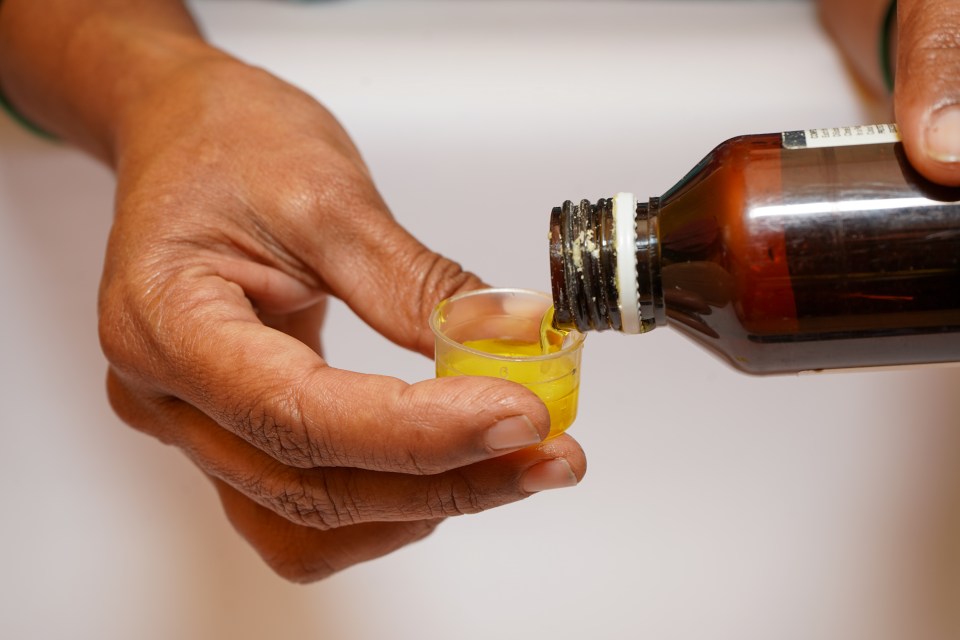A SUSPECTED case of drug poisoning has tragically killed at least 14 children in two weeks.
Health officials believe contaminated cough syrup could be responsible for the sudden outbreak of kidney failure among children under five.
GettyContaminated cough syrup could be the cause of at least 14 children’s deaths over a fortnight[/caption]
The tragedy began in Chhindwara district in Madhya Pradesh in India, where children began to suffer from what appeared to be routine seasonal fevers.
Parents reported their children had mild colds and were prescribed cough syrups by local doctors.
Despite symptoms at first subsiding, the children stopped urinating and developed severe kidney infections within days.
Three children died in Nagpur, despite receiving advanced medical care.
Lab tests later revealed the presence of diethylene glycol in kidney tissue samples.
Diethylene glycol is a toxic chemical linked to drug contamination commonly found in products like anti-freeze, brake fluid and industrial solvents.
In 2023, cough syrup thought to be contaminated with the chemical at its production plant in India reportedly led to the deaths of almost 300 children in Gambia, Indonesia and Uzbekistan.
Most of the children had been prescribed Coldrif and Nextro-DS syrups.
Sheelendra Singh, the Chhindwara collector, banned the sale of both medications in the district, issuing a warning to parents, doctors and pharmacies.
“No waterborne illnesses were detected in the affected areas,” he said.
“The drug link cannot be ignored.”
Experts from the Indian Council of Medical Research have been dispatched alongside health teams into villages including Parasia and Newton Chikli.
Officials are conducting door-to-door surveys and collecting medicine samples.
Families are also being interviewed in order to identify other potential cases.
Dr Naresh Gore, the Chief Medical Officer, confirmed the first death on September 7, saying the earliest case could date back to August 24.
A spike in kidney-related complications was noted after September 20.
Blood and medicine samples have been sent to the Virology Institute in Pune for further analysis.
According to doctors, the symptoms resemble acute encephalitis syndrome (AES), a condition marked by sudden brain inflammation.
Children arrived at hospitals with high fevers but deteriorated rapidly.
Some lost consciousness within 24 hours of presenting to the emergency departments.
Many children also reported suffering acute renal failure, and required ventilators and dialysis.
Six deaths were recorded in the Parasia Block, where all victims were between just three and ten years of age.
The area has since been declared a high-alert zone.
The mystery has deepened, as tests on blood and cerebrospinal fluid ruled out common viral and bacterial infections.
Teams from the National Centre for Disease Control and the National Institute of Virology have been deployed to investigate the ordeal further.
Surveillance has been extended to cover rural Vidarbha and nearby regions, as similar cases continue to emerge.
Some recent diagnoses have shifted from encephalitis to acute encephalopathy, which can result from chemical exposure or environmental toxins rather than viral infections.
Despite the numerous deaths, national health agencies have remained silent.
Dr. Vikas Krishnananda, a paediatric neurologist at Kinder Hospitals in Bangalore, said early findings suggested a possible link to the Chandipura virus.
There is no vaccine for Chandipura at present.
However, the virus is similar to Japanese encephalitis, a more common illness, which is preventable through immunisation.
Families have continued to demand answers and accountability for the deaths of their children.
“Our children had never even been sick before,” one distraught parent said.
“They developed a slight temperature this time.
“Their urination ceased after the syrup. We were unable to save them,” said another.
An investigation into the deaths is ongoing.

